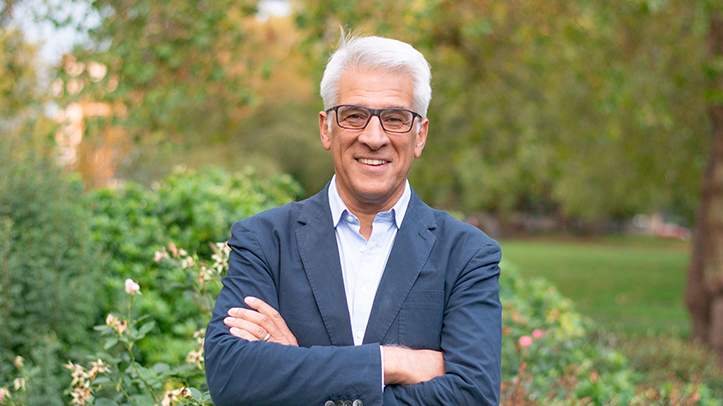
We are all in the same Covid storm, but it is clear we’re in very different boats! It’s a point that is often made. This strange virus is fundamentally unequal in its impact. It has exposed and exaggerated deep inequalities in our society. But our opportunity is not simply to analyse the impact of the wind – we’ve long known that if you grow up in poverty you’ll have fewer opportunities to live a healthy, prosperous life. The pandemic gives us the chance to re-evaluate, to search for deeper answers and to change the weather!
As the cost of the ‘let’s get back to where we were’ interventions grows, so too does the imperative for developing a clear strategy around building a different future; a ‘reset’ that offers a greater degree of equality to all, rather than a simple ‘reopen’.
Over the last 35 years the Oasis Trust, of which I am the founder, has developed work in more than 40 disadvantaged local communities around England as well as others in countries around the world. Across that time we have specialised in building, and helping others build, strong inclusive neighbourhoods where everyone is given the opportunity to flourish and achieve their potential.
So, aside from primary and secondary schools, alternative education and supported housing, we have also developed a wide variety of other community building projects and initiatives; everything from foodbanks to debt advice centres, savings clubs to credit unions, city farms to community shops, breakfast clubs to adult literacy courses, children’s centres to refugee housing, libraries to football teams and health projects to employment initiatives. We call this approach a community ‘hub.
Why does Oasis develop hubs
Because an integrated and holistic approach to the needs of families:
- Produces better health, wellbeing, relational and employment outcomes
- Creates a one-stop shop approach to the delivery of family services
- Builds and empowers local communities
- Deploys human and financial resources at a local level more effectively
Successful hubs achieve two goals:
- Joined up delivery of a range of different services to families
- Joined up teams around families.
What follows are some of the weather changing ‘hub’ principles that we build into our work, and which we would recommend are essential to any successful ‘build back better’ local community and family policy:
Service delivery is not the same as community development
Our work is based on the principle of community development rather than of service delivery. The two are very different. Service delivery has a narrow lens. It puts money into ‘quick results’ and specific initiatives. It is blinkered to the wider needs of the community, and so tends to deal with the symptoms rather than exploring the causes of poverty and disadvantage. Community development requires a longer-term approach with a wider lens.
More than this, because service delivery tends to over focus onthe presenting needs of today, it is less likely to make the necessary investments to reduce risk tomorrow. It is mesmerised by the storm, rather than seeking to change the wind.
Do things ‘with’ people; not ‘to’ them or ‘for’ them.
Our goal is to work with the power of community, instead of inadvertently ignoring, overriding or replacing it. It is our job to spot the existing informal, as well as formal networks, skills and strengths in a community, and to partner with them – turning recipients into providers. That means actively engaging community members and grassroots groups in designing, delivering and leading services. Our experience is that the over-professionalisation of support can corrode community engagement and ownership, rather than enhance it; often disempowering and robbing families of a sense of honour and dignity, instead of deepening and strengthening local ownership.
Co-location is not holistic integration
We seek to work in an integrated and holistic way, because we have learnt that separate, non-integrated ‘solutions’ often fail to achieve lasting change. For instance, we might be able to support a young person in school, provide youth work interventions at evenings and weekends, support their wider family through our debt advice centre and their siblings as part of our employability programmes. This ‘joined up’ approach, focused around every child in the context of their whole lives, their whole family and their whole community, produces significant added value, beyond that of any of the individual elements of our work, because the different parts of the story add up to the whole.
Our work involves us in myriad local partnerships – with statutory agencies, businesses, community groups and other charities – but co-operation and even co-location can easily mask poor integration.
Hyper-local delivery, national coordination
Context is everything. One size never fits all. In each community we work in, our approach – although based on the same principles – is bespoke; tailored to each hyperlocal neighbourhood (often equivalent to a Local Authority ward)
Be incarnational – lead from within
Although we employ many staff, our goal is to ensure that a number of key ‘hub’ staff live in and are part of the community. The ‘come and go’ of professionals in smart cars and smart clothes is not only dizzying to local communities, it cannot build trust or true partnership. Equally important is longevity; it takes time – more time than a parliamentary cycle – for relationships to deepen, perspective to settle, and sustainable work to take root and develop.


